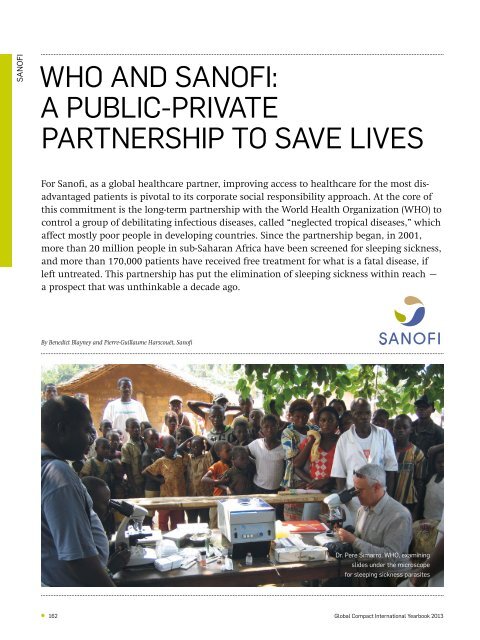Global Compact International Yearbook Ausgabe 2013
The UN Global Compact is the world’s leading platform for corporate sustainability. In describing the future aims of the Global Compact, UN Secretary-General H.E. Ban Ki-moon says: “A growing number of business in all regions recognize the importance of reflecting environmental, social, and economic considerations in their operations and strategies. Now the challenge is to move from incremental process to transformation – in society and markets alike.” The new 2013 edition of the Global Compact International Yearbook offers proactive and in-depth information on key sustainability issues and focuses on recent developments of stakeholder management such as managing corporate legitimacy, for example. Concomitant to this is the call for a more holistic reporting of companies’ financial and nonfinancial performance, which is expressed in the idea of integrated reporting. Furthermore, this edition highlights the connection between the sustainable development of African societies and the ways of managing and governing their natural wealth. The newest developments concerning the move toward a low-carbon economy are shown in the chapter on climate change, which emphasizes the importance of reducing the output of greenhouse gases. Corresponding to the idea of mutual learning, the Global Compact International Yearbook includes 43 good practices of corporate participants that showcase different approaches to the implementation of the Ten Principles of the Global Compact. The Global Compact International Yearbook is a product of the macondo media group and United Nation Publications in cooperation with the Global Compact Office in support of the UN Global Compact and the global advancement of corporate sustainability. It contains 196 pages.
The UN Global Compact is the world’s leading platform for corporate sustainability. In describing the future aims of the Global Compact, UN Secretary-General H.E. Ban Ki-moon says: “A growing number of business in all regions recognize the importance of reflecting environmental, social, and economic considerations in their operations and strategies. Now the challenge is to move from incremental process to transformation – in society and markets alike.”
The new 2013 edition of the Global Compact International Yearbook offers proactive and in-depth information on key sustainability issues and focuses on recent developments of stakeholder management such as managing corporate legitimacy, for example. Concomitant to this is the call for a more holistic reporting of companies’ financial and nonfinancial performance, which is expressed in the idea of integrated reporting. Furthermore, this edition highlights the connection between the sustainable development of African societies and the ways of managing and governing their natural wealth. The newest developments concerning the move toward a low-carbon economy are shown in the chapter on climate change, which emphasizes the importance of reducing the output of greenhouse gases.
Corresponding to the idea of mutual learning, the Global Compact International Yearbook includes 43 good practices of corporate participants that showcase different approaches to the implementation of the Ten Principles of the Global Compact. The Global Compact International Yearbook is a product of the macondo media group and United Nation Publications in cooperation with the Global Compact Office in support of the UN Global Compact and the global advancement of corporate sustainability. It contains 196 pages.
You also want an ePaper? Increase the reach of your titles
YUMPU automatically turns print PDFs into web optimized ePapers that Google loves.
sanofi<br />
WHO and Sanofi:<br />
A Public-Private<br />
Partnership to Save Lives<br />
For Sanofi, as a global healthcare partner, improving access to healthcare for the most disadvantaged<br />
patients is pivotal to its corporate social responsibility approach. At the core of<br />
this commitment is the long-term partnership with the World Health Organization (WHO) to<br />
control a group of debilitating infectious diseases, called “neglected tropical diseases,” which<br />
affect mostly poor people in developing countries. Since the partnership began, in 2001,<br />
more than 20 million people in sub-Saharan Africa have been screened for sleeping sickness,<br />
and more than 170,000 patients have received free treatment for what is a fatal disease, if<br />
left untreated. This partnership has put the elimination of sleeping sickness within reach –<br />
a prospect that was unthinkable a decade ago.<br />
By Benedict Blayney and Pierre-Guillaume Harscouët, Sanofi<br />
Dr. Pere Simarro, WHO, examining<br />
slides under the microscope<br />
for sleeping sickness parasites<br />
162 <strong>Global</strong> <strong>Compact</strong> <strong>International</strong> <strong>Yearbook</strong> <strong>2013</strong>

















